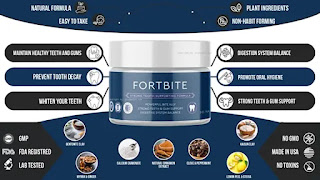What are some common habits that can negatively impact teeth and gum support, and how can they be avoided?
To boost
strong teeth and gum
support, you can follow the tips mentioned earlier while also
incorporating additional practices into your oral care routine. Here are some
more specific strategies to help improve the health of your teeth and gums:
·
Oil Pulling:
Consider adding oil pulling to your oral care routine. Swish one tablespoon of
coconut oil or sesame oil in your mouth for 15-20 minutes before spitting it
out. Oil pulling can help reduce harmful bacteria in the mouth and promote
healthier gums.
·
Chew Sugar-Free Gum: Chewing
sugar-free gum after meals can stimulate saliva production, which helps
neutralize acids and wash away food particles. Look for gum sweetened with
xylitol, as it may also have additional benefits for oral health.
·
Use a Tongue Scraper:
Bacteria can accumulate on the tongue, contributing to bad breath and potential
gum issues. Using a tongue scraper daily can help remove these bacteria and
improve overall oral hygiene.
·
Drink Green Tea: Green
tea contains natural compounds that have been linked to improved oral health.
Regularly drinking unsweetened green tea may help reduce the growth of harmful bacteria
and support healthier gums.
·
Consider Probiotics: Some
studies suggest that certain probiotics can help promote oral health by
reducing harmful bacteria in the mouth. Talk to your dentist or healthcare
provider about incorporating probiotics into your routine.
·
Avoid Teeth Grinding: If you
grind your teeth (bruxism), it can lead to dental issues and gum problems.
Speak to your dentist about potential solutions, such as a custom mouthguard to
protect your teeth while you sleep.
·
Use a Water Flosser: Water
flossers, also known as oral irrigators, can be an effective alternative to
traditional flossing. They use a stream of water to remove plaque and debris
between teeth and along the gumline.
·
Massage Your Gums: Gently
massaging your gums with your finger can help improve blood circulation and
strengthen gum tissue. This can be done after brushing and flossing.
·
Rinse with Saltwater: Rinsing
your mouth with warm saltwater can help reduce inflammation, promote healing,
and create an inhospitable environment for bacteria.
·
Limit Alcohol and Sugary Snacks: Alcohol
can dry out your mouth, reducing saliva production and increasing the risk of
tooth decay. Additionally, sugary snacks can contribute to plaque formation.
Try to limit consumption of both.
·
Maintain Overall Health: Many
systemic health conditions can impact oral health. Take care of your overall
health by managing chronic conditions, such as diabetes, that can affect your
gums and teeth.
Remember
that consistency is key to achieving and maintaining strong teeth and gum
support. Incorporate these practices into your daily routine, and don't forget
to visit your dentist regularly for professional check-ups and advice tailored
to your specific oral health needs.


Comments
Post a Comment